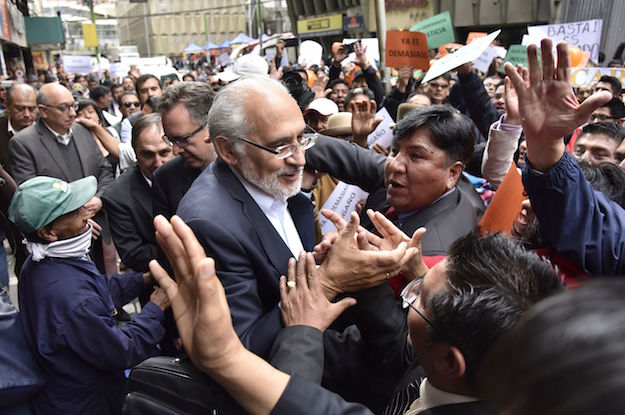According to the U.S.’ National Bureau of Economic Research, all is not well with Bolivia’s economy.
In a report published earlier this year, the bureau cited rising external debt and falling international reserves as early markers of a balance-of-payments crisis in the making. The authors note several similarities of current economic policies to those that preceded Bolivia’s debt crisis in the 1980s, including the country’s adoption of a fixed exchange rate.
But as long as Bolivia’s economy continues to expand – the World Bank estimates GDP grew 4.2% in 2018 and will grow another 4% this year – distant and uncertain economic risks are unlikely to trouble voters. That’s making work harder for Carlos Mesa as he prepares to challenge President Evo Morales in elections this October.
Since Morales took office in 2006, he has used revenues from oil and gas exports to cut extreme poverty in half, drive consumer demand, invest in infrastructure and buffer Bolivia’s economy from much of the pain that affected its neighbors when the 2000s commodities boom came to an end.
But according to Mesa, a former president who recently represented Bolivia in its maritime dispute with Chile at the International Court of Justice, “(Morales’) economic model worked during prosperous times, but is not sustainable.”
In an interview with AQ, Mesa, 66, promised “more sensible and rational spending” if he wins the general election on Oct. 20. Mesa, who assumed the presidency in 2003 after the resignation of President Gonzalo Sánchez de Lozada, is considered the biggest threat to the president’s re-election chances. Last year, Bolivia’s top electoral court gave Morales’ candidacy the green light following the constitutional court’s 2017 decision to effectively nullified the term limit established in Bolivia’s constitution. That decision ignored the results of a 2016 referendum in which 51% of voters opposed amending the constitution to allow Morales to run for a fourth term.
Despite economic warnings and the dismissal of the referendum results, Morales is still the frontrunner. Polls suggest he could win in the first round of voting by hitting a 40% threshold with a 10-point lead over Mesa. If Morales falls short of this, Mesa has a better shot in a second-round run-off.
Given Morales’ first-round advantage, sentiment among the opposition surrounding Mesa’s chances has “moved from enthusiasm to concern” in recent months, political analyst Raúl Peñaranda told AQ. There are both political and economic reasons for Mesa’s slip in polls.
For starters, issues like Bolivia’s fiscal deficit, which ranked second highest in the region after Venezuela last year, remain invisible to many voters as the economy continues to grow. Reducing Bolivia’s debt would mean reining in spending in a country where distributive policies and public investment have helped triple GDP per capita since Morales took office in 2006.
Further, to keep exports competitive and address external imbalances, “Bolivia is going to have to devalue its currency after the election,” said Rodrigo Riaza, an analyst at the Economist Intelligence Unit. This would push prices up for consumers. “It is very unpopular politically,” said Riaza.
Mesa is aware of the difficulties involved in campaigning on economic reforms. He told AQ that Bolivia needs to be more inviting to foreign investment, but noted that “by no means does this mean privatization.”
To avoid some of these risks, Mesa has focused his campaign on political issues. That includes Morales’ encroachment on democratic norms, including his refusal to adhere to the referendum results or his heavy hand in the judiciary.
But even here, the president is a difficult target. Since his election in 2005, Morales has brought millions of indigenous and poor Bolivians into the political process for the first time.
“It’s hard to make your campaign theme the recovery of democracy when people don’t even feel like they’ve lost it,” journalist Hernán Terrazas told AQ.
In that context, reaching the roughly 20% of voters who are still undecided may present a challenge.
“(Mesa) decided to avoid messages that were aggressive against Morales because they could cause a negative response,” Terrazas told AQ. “(But) elections are like boxing. If one of the fighters doesn’t fight, he is not going to win.”
Adding to Mesa’s troubles are existing divisions within Bolivia’s opposition, which have sunk previous attempts to unseat Morales. Running third in polls, behind Mesa, is Senator Óscar Ortiz, whose support has grown over recent months and sits around 10% of the vote.
“Mesa’s decline can be attributed to Ortiz’s rise,” said Riaza.
On Aug. 22, Mesa rejected an invitation from Ortiz to a debate, telling reporters that “the only two candidates with a chance to win this election are Morales and myself.”
In July, Ortiz’s running mate resigned and said he hoped his departure would help swing voters in support of Mesa. However, a poll taken after the resignation actually showed less support for Mesa than earlier in the year.
The resignation “hurt both candidates because it only added to the fragmentation,” said Riaza.
Mesa, meanwhile, said he’s confident the opposition will unite around him in the end – because they won’t have another viable option.
“Polls indicate that as election day approaches, there will be many voters who may have had doubts or who would have voted for other candidates that will add their votes (to me) to ensure that the opposition wins,” Mesa told AQ. “And wins with a candidate who represents them.”
—
O’Boyle is a senior editor of AQ. Uriegas is a fellow at NPR’s Latino USA podcast and a former editorial intern for AQ.







